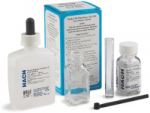As I have posted in my other thread on our pool leak, this is a new house we are planning on moving into in the future. Just need to get things straight at our current home first.
This pool has a leak and I'm working on getting it fixed.
My question is we have a well and a Culligan softener system in the house. The previous owners have been adding water to the pool from the house water. It is to the point now that we have to add so much water I'm concerned about putting stress on the softener system. Our water has some iron, but not much from what Culligan has told me. It does have sulfur, or at least it has that smell to it and we have a separate system to take that out of the water. This is in eastern NC near the coast and the well is 70 ft deep.
I know how to check my chemicals. So my question is how bad would it be to just use water straight from the well?
I did a search and couldn't find information or another topic on it.
25k gallon, vinyl with SWG, sand filter and variable speed pump.
This pool has a leak and I'm working on getting it fixed.
My question is we have a well and a Culligan softener system in the house. The previous owners have been adding water to the pool from the house water. It is to the point now that we have to add so much water I'm concerned about putting stress on the softener system. Our water has some iron, but not much from what Culligan has told me. It does have sulfur, or at least it has that smell to it and we have a separate system to take that out of the water. This is in eastern NC near the coast and the well is 70 ft deep.
I know how to check my chemicals. So my question is how bad would it be to just use water straight from the well?
I did a search and couldn't find information or another topic on it.
25k gallon, vinyl with SWG, sand filter and variable speed pump.


